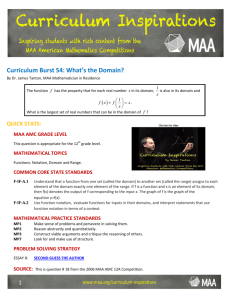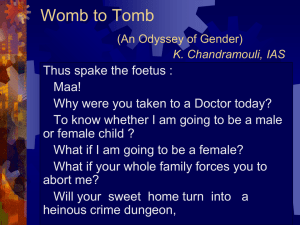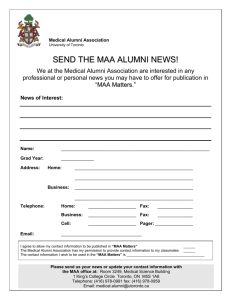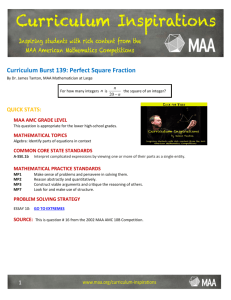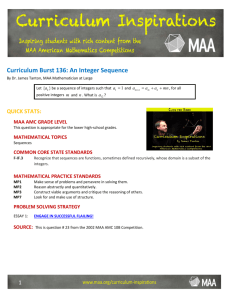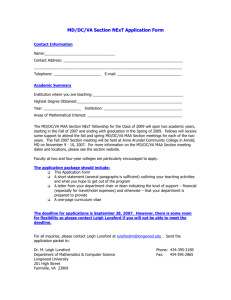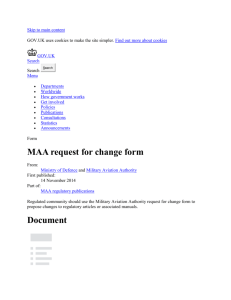power point presentation - MAA Sections
advertisement
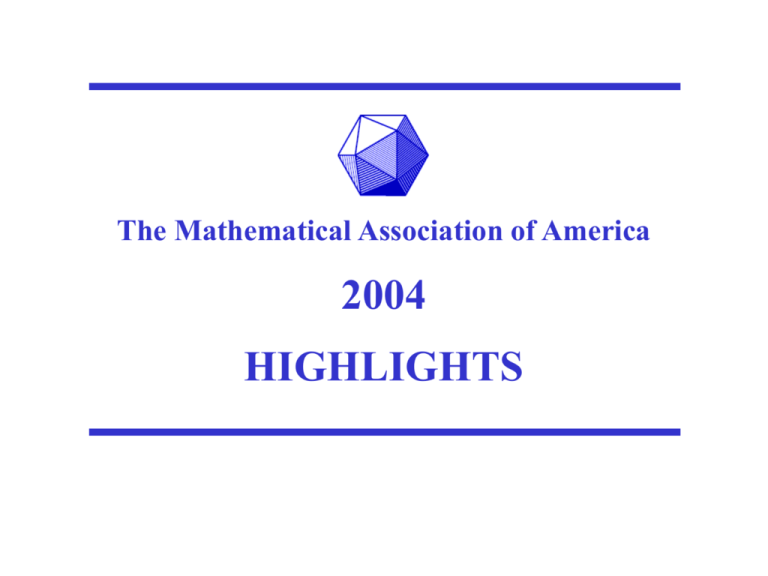
The Mathematical Association of America 2004 HIGHLIGHTS Undergraduate Programs and Courses in the Mathematical Sciences: CUPM Curriculum Guide 2004 This is the first CUPM report to address the entire undergraduate mathematics curriculum, for all students. It is the result of four years of work including extensive consultation with hundreds of mathematicians as well as biologists, chemists, economists, engineers, and faculty in other partner disciplines. Supported by grants from NSF and the Calculus Consortium for Higher Education The Mathematical Association of America Six general recommendations endorsed by the MAA Board of Governors Sixteen additional recommendations that address specific student audiences including general education courses, majors in partner disciplines, prospective teachers, and mathematical science majors preparing for the non-academic workforce or for graduate school. The Guide and its companion Illustrative Resources are available at www.maa.org/cupm The Mathematical Association of America Convergence On-line Magazine that uses history to teach mathematics Funding from NSF Division of Undergraduate Education, 2001 through 2008. Nine PREP workshops for 2004 include: interdisciplinary topics (two on mathematics and biology), topics in current mathematics, and innovative curricula and pedagogical issues. Workshops have three components: preparatory component, intensive component, and follow-up that may include sessions at national meetings and electronic communication All workshops are “hands-on”, provide opportunity to work with colleagues to explore new ideas, and establish relationships for long-term professional support. A PREP 2004 brochure has been sent to all MAA members. More information and applications at the PREP website, http://www.maa.org/prep. • Collaboration between MAA and AMATYC, funded by ExxonMobil • Participants are new or recently hired faculty at two-year colleges • Goals: develop a cadre of faculty who are – effective teachers and scholars – engage in the full range of professional activities • Participate in ACCCESS activities: – Weeklong programs concurrent with two consecutive AMATYC Conferences – ACCCESS and/or NExT at MAA Section meeting near home institution – Electronic Network of Fellows and senior mathematics faculty • Partnerships with MAA sections: – Create a Section ACCCESS program, can be extension of Section NExT – Contact Gavin LaRose, glarose@umich.edu, for Section information and funding • Project ACCCESS: http://www.maa.org/ProjectACCCESS. The Mathematical Olympiad Summer Program (MOSP) will be on the University of Nebraska-Lincoln campus, June 13-July 3, 2004. Students will be treated to classes on advanced mathematical topics, special guest speakers, mathematical contest training and related social and mathematical activities. A special purpose of the MOSP is to identify the 6 students will represent the US at the International Mathematical Olympiad (IMO). The IMO will be in Athens, Greece from July 6 - July 19, 2004. http://www.unl.edu/amc The 30 top scoring students on the USA Mathematical Olympiad (April 27 and 28, 2004) will be invited to attend the Mathematical Olympiad Summer Program. Thanks to a grant from the Akamai Foundation, the MOSP will also invite an additional (approximately) 30 ninthgrade USAMO participants for a special simultaneous MOSP program aimed at preparing them for future Olympiad level competitions. http://www.unl.edu/amc MAA Science Policy Initiatives • Contract with Lewis-Burke Associates, calendar year 2004 – Washington Public Policy Advocacy Group – Congressional contacts – Federal Agency contacts – Monthly reports to Science Policy Committee and Executive Director MAA Science Policy Initiatives • Science Policy Committee Meeting, March 22-23 – Arrangements and Briefings by Lewis-Burke – Meet with Federal Agency Representatives – Meet with Members of Congress • Science Policy Committee Website – Updated regularly MAA Science Policy Initiatives We participate in • Committee on National Science Funding: exhibits for Congress, Reports and Letters to Congress and the President • Council of Scientific Society Presidents • Joint Policy Board for Mathematics (MAA, AMS, SIAM, ASA) – Mathematics Awareness Month – Communications Award – Meetings with Federal Agency people and Congressional Representatives MAA Study Tour of England May 20th - June 3rd Abbreviated Itinerary London: Friday, May 21 – Monday, May 24 Private guided tours of the British Museum’s Babylonian, Egyptian, and Greek collections, the British Library’s works of Leonardo da Vinci, Galileo, and Newton; Ranleigh Gardens; Chelsea Physic Garden; and the Tower of London with a talk on Harriot; the architecture of Christopher Wren. Oxford: Tuesday, May 25 – Thursday, May 27 Walking tour of Oxford conducted by Robin Wilson; Keble College; Bodleian Library; dinner hosted by Oxford mathematicians; Museum of the History of Science; talks by university mathematicians; Stonehenge, Avebury, and travel through the Cotswalds. MAA Study Tour of England May 20th - June 3rd Abbreviated Itinerary Cambridge: Friday, May 28 – Tuesday, June 1 Bletchley Park, the Colleges of Cambridge; Grantham; Newton’s home,Woolsthorpe Manor; Trinity College; Science Museum; the Wren Library, viewing a Newton first edition; New Cavendish Library; talk on mathematical physics. London: Wednesday, June 2 – Thursday, June 3 Visit to the Royal Society; farewell banquet. See you at August 12th - 14th in MAA INVITED ADDRESSES Pebbling Results by Undergraduate Researchers Aparna Higgins, University of Dayton The Mystery of the Missing Tangents Steven Sigur, The Paideia School, Atlanta How Computer Graphics is Changing Hollywood Tony DeRose, Pixar Animation Studios visit www.maa.org for more details
